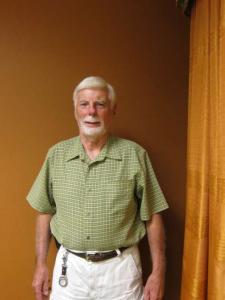Leonard Roche

The Working Waterfront Festival Community Documentation Project
This project documents the history and culture of the commercial fishing industry and other port trades. The project began in 2004 in conjunction with the Working Waterfront Festival, an annual, educational celebration of commercial fishing culture which takes place in New Bedford, MA. Interviewees have included a wide range of individuals connected to the commercial fishing industry and/or other aspects of the port through work or familial ties. While the majority of interviewees are from the port of New Bedford, the project has also documented numerous individuals from other ports around the country. Folklorist and Festival Director Laura Orleans and Community Scholar and Associate Director Kirsten Bendiksen are project leaders. The original recordings reside at the National Council for the Traditional Arts in Maryland with listening copies housed at the Festival's New Bedford office.
Laura Orleans
Dr. Leonard Roche is a retired fisherman and educator from New Bedford, Massachusetts. Born into a family of Newfoundland descent, Roche has a rich history in the fishing industry, having started his career as a lumper before transitioning into roles that allowed him to represent the fishing industry in various organizations, such as Boat Owners United and the Northwest Atlantic Fisheries Treaty Organization. In addition to his work in the fishing industry, Roche also had a simultaneous career in education, serving as a school principal. His unique background and experiences have given him a deep understanding of the fishing industry's history, its evolution, and the challenges it faces.
Scope and Content Note
This interview with Dr. Leonard Roche, conducted by Madeleine Hall-Arber and transcribed by Laura Orleans, took place on September 25, 2010, at the Working Waterfront Festival. The interview provides a comprehensive look into Roche's life and experiences in the fishing industry, as well as his insights into the industry's evolution and challenges. Roche discusses his family background, his start in the industry as a lumper, and his work with Gerry Studds on the Studds-Magnuson Bill. He also shares his experiences representing the fishing industry in various organizations and his views on the relationship between the fishing communities in Newfoundland and New Bedford. The interview also delves into the changes in the fishing industry, including the trend towards corporatization, the dissolution of unions, and the impact of regulations. Roche also shares stories from his time in the industry, including the story of Fish Mary, the changes in technology and navigation methods, and the impact of foreign factory ships. In the second part of the interview, Roche discusses the changes in the industry in the late 1970s and early 1980s, including the introduction of corporate fleets and the impact of drugs. He also shares his concerns about licensing limiting the entry of new people into the industry and the importance of having an education to fall back on. The interview provides a valuable historical perspective on the fishing industry, its evolution, and the challenges it faces, making it a valuable resource for researchers interested in the history of the fishing industry in New Bedford and the broader Atlantic region.
Please Note: The oral histories in this collection are protected by copyright and have been created for educational, research and personal use as described by the Fair Use Doctrine in the U.S. Copyright law. Please reach out Voices@noaa.gov to let us know how these interviews are being used in your research, project, exhibit, etc. The Voices staff can help provide other useful resources related to your inquiry.
The NOAA mission is to understand and predict changes in climate, weather, oceans, and coasts, to share that knowledge and information with others, and to conserve and manage coastal and marine ecosystems and resources. The Voices Oral History Archives offers public access to a wide range of accounts, including historical materials that are products of their particular times, and may contain offensive language or negative stereotypes.
Voices Oral History Archives does not verify the accuracy of materials submitted to us. The opinions expressed in the interviews are those of the interviewee only. The interviews here have been made available to the public only after the interviewer has confirmed that they have obtained consent.
